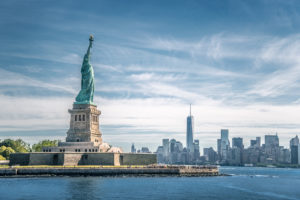
Secretary of State announces new refugee cap, inquiry into sexual assault allegations against Kavanaugh develops, and more…
IN THE NEWS
- U.S. Secretary of State Michael Pompeo announced a new cap of 30,000 refugees to be admitted in 2019, a decrease from the current cap of 45,000. Secretary Pompeo noted the need for “renewed focus and prioritization” of asylum cases and set a target of processing 280,000 asylum seekers in addition to refugees. The new cap has come under criticism from refugee resettlement groups, with Rev. John McCullough, President and CEO of Church World Service, describing the cap as “an affront to the countless American communities who have welcomed refugees and understand that they are valuable members of their cities and towns.”
- Christine Blasey Ford, who accused U.S. Supreme Court nominee Judge Brett Kavanaugh of sexual assault, reportedly stated that she would be willing to testify before the U.S. Senate Judiciary Committee. The Committee has scheduled a hearing on the allegations for September 24. In an email, Ford’s lawyer Debra Katz stated that Ford’s “strong preference” is “for a full investigation prior to her testimony.” Kavanaugh reportedly stated that he would be ready to testify next week “to defend my integrity.”
- The Antitrust Division of the U.S. Department of Justice closed its investigation and authorized the $67 billion merger between health insurer Cigna and Express Scripts, a pharmacy benefit management company. The transaction “is unlikely to result in harm to competition or consumers,” said Makan Delrahim, Assistant Attorney General for the Antitrust Division. Separately, insurance regulators of 16 states have cleared the merger.
- President Donald J. Trump signed into law the Veterans Treatment Court Improvement Act, which will require the U.S. Department of Veterans Affairs (VA) to hire 50 additional veteran justice outreach specialists. According to the VA, the specialists support veterans “in the local criminal justice system” who are facing incarceration, homelessness, and mental illness. The specialists also help veterans comply with regulations governing access to Veterans Health Administration services.
- An internal U.S. Department of Commerce memo recently released as part of a lawsuit led by New York revealed that the Justice Department had expressed concerns about bad press if it were to request a citizenship question on the 2020 census. The Justice Department had initially refused a request from the Commerce Department to add the question to the 2020 census, contrary to Secretary of Commerce Wilbur Ross’s testimony before the U.S. House of Representatives Committee on Ways and Means. Ross had testified that the Justice Department initiated the process to add a citizenship question to help it enforce the Voting Rights Act’s prohibition against discrimination.
- A number of immigration advocacy groups sued the U.S. Citizenship and Immigration Service (USCIS) for allegedly failing to produce internal documentation of its processing of citizenship applications. The plaintiffs alleged that USCIS failed to respond to their request within the Freedom of Information Act’s statutory time limit. USCIS reportedly claimed that it was on pace to exceed “a 5-year high in the number of applications processed,” but U.S. Representative Jimmy Gomez (D-Calif.) stated that the Trump Administration is creating a “second wall” to citizenship through USCIS’s “unprecedented citizenship application backlogs.”
- The Bureau of Land Management published a final rule revising oil and natural gas production regulations contained in a 2016 rule on waste prevention. The 2016 rule, according to the U.S. Department of the Interior, was “unnecessarily burdensome on the private sector.” However, Senator Tom Udall (D-N.M.) criticized the new regulation as a “giveaway” to “corporate polluters” that went against “the overwhelming majority” of public comments on the proposed rule.
- The Los Angeles City Council unanimously approved a motion to draft a city ordinance prohibiting the manufacture and sale of fur products. The ordinance, if approved, would include an exception for used fur and would be phased in over a period of two years. Keith Kaplan, spokesman for the Fur Information Council of America, reportedly cited the potential “impact on jobs” and “tax revenues” as downsides to the proposed ban. Councilmember Bob Blumenfield reportedly stated that the vote was “a moral win.”
- Following further tariffs on Chinese imports into the United States, China responded with counter-tariffs of its own on $60 billion worth of U.S. products. The Office of the U.S. Trade Representative stated that the U.S. tariffs were in response to “China’s theft of American intellectual property and forced transfer of American technology.” Chinese state television reportedly responded by claiming that the counter-tariffs were “a measure of last resort against American unilateralism and trade protectionism.”
WHAT WE’RE READING THIS WEEK
- Legislation sanctions on the Kremlin for interfering with elections in the United States would be “more likely to inflict pain on Russia” than sanctions by executive order, wrote Megan Reiss of the R Street Institute for Lawfare. Reiss hailed President Trump’s recent executive order concerning election interference as a “welcome addition,” but questioned whether the order—which may be rescinded at any time—is a sufficient deterrent. Legislation, according to Reiss, “will make it clear” that the “U.S. government will be legally obligated to respond to attempts to interfere in our democratic process.”
- In an article for the Journal of Air Law and Commerce, Paul Stephen Dempsey of McGill University examined how the deregulation of airlines led to “destructive competition,” worse service, and collusion between major airlines. Dempsey noted that the U.S. Department of Transportation has been inconsistent when regulating airline competition, as it has “liberalized ‘open skies’” agreements with many countries, yet it allowed airlines to fix prices and capacity for certain routes. These practices have resulted in a “regulatory mess with no clear solutions.”
- Dan Ciuriak, Senior Fellow at the Centre for International Governance Innovation, wrote in a recent paper that the “data-driven economy” presents competing “regulatory concerns,” including privacy, economic and tax policy, and “integrity of democratic processes.” Ciuriak also highlighted the risk of market failure due to artificial intelligence (AI) and machine learning, which would widen the gaps between companies and countries with AI capability and those without it. International regulators must work collaboratively to design a “new sustainable trade bargain for the digitally enabled economy,” Ciuriak concluded.



